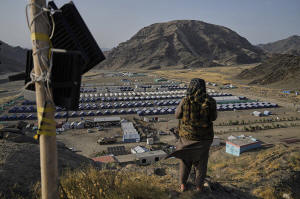Taliban tortured and threatened Afghans expelled from Pakistan and Iran,
UN report says
[July 24, 2025]
ISLAMABAD (AP) — The Taliban have tortured and threatened Afghans
forcibly returned from Iran and Pakistan because of their identity or
personal history, a U.N. report said Thursday.
Pakistan and Iran are expelling millions of Afghans who they say are
living in their countries illegally. Afghan authorities have urged
nationals to return, pledging amnesty for anyone who left after the
Taliban seized power in 2021.
But rights groups and the U.N. have repeatedly warned that some of those
returning are at risk of persecution because of their gender, links to
the former Western-backed administration or profession.
Thursday’s report from the U.N. mission in Afghanistan said some people
have experienced serious human rights violations, while others have gone
into hiding or relocated for fear of Taliban reprisal.
The violations include torture, ill-treatment, arbitrary arrest, and
threats to personal security at the hands of the Taliban, according to
the report.
A former government official told the U.N. mission that, after his
return to Afghanistan in 2023, he was detained and severely tortured
with sticks and cables. He was waterboarded and subjected to a mock
execution.
A non-binary person said they were beaten severely, including with the
back of a gun.

Volker Türk, the U.N. high commissioner for human rights, said nobody
should be sent back to a country where they faced the risk of
persecution on account of their identity or personal history. This was
even more pronounced for Afghan women and girls, who were subjected to a
range of measures “amounting to persecution based on their gender
alone,” he added.
The Taliban have imposed severe restrictions on Afghan girls and women,
cutting off education beyond sixth grade, most employment and access to
many public spaces.
Responding to the report, Taliban authorities denied mistreating Afghan
returnees and rejected allegations of arrest, violence, intimidation or
retaliation against people because of their identity or personal
history.
[to top of second column]
|

A Taliban fighter stands on a hill overlooking a camp housing Afghan
refugees who have been repatriated from Pakistan, near the
Pakistan-Afghanistan border, in Torkham, Afghanistan, May 31, 2025.
(AP Photo/Ebrahim Noroozi, File)

Afghans returning from neighboring countries were provided with
facilities related to documentation, transportation, resettlement,
and other legal support, they said, while the Interior Ministry
provides a “warm welcome.”
They called on the U.N. mission to prevent forced deportations,
adding the United Nations as a whole “should not hesitate” in
providing basic needs to refugees, such as food, medicine, shelter
and education.
Afghans who left their homeland in the millions over the decades are
either being pushed out in expulsion campaigns, like those in Iran
and Pakistan, or face an uncertain future because of reduced support
for refugees.
On Monday, thousands of Afghans in the U.S. lost protection from
deportation after a federal appeals court refused to postpone U.S.
President Donald Trump administration’s decision to end their legal
status.
Homeland Security officials said in their decision to end the
Temporary Protected Status for Afghans that the situation in their
home country was getting better. But groups helping Afghans with
this status say the country is still extremely dangerous.
The Trump administration’s January suspension of a refugee program
has left thousands of Afghans stranded, particularly in Pakistan,
and a travel ban on Afghans has further diminished their hopes of
resettlement in the U.S.
All contents © copyright 2025 Associated Press. All rights reserved |